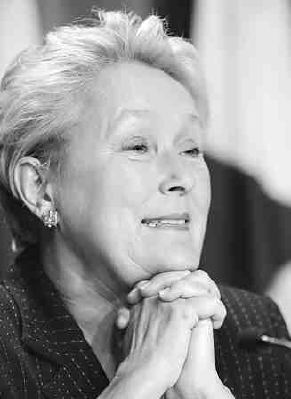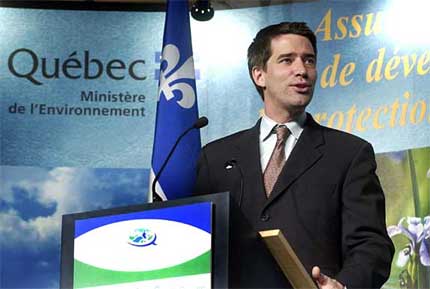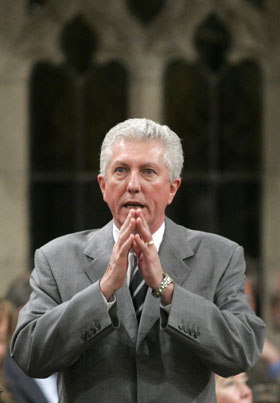| Andre Boisclair Leaves Politics
The Canada eZine - Quebec
Andre Boisclair steps down as PQ leader May 8th 2007. Embattled Andre Boisclair ended his brief reign as leader of the Parti Quebecois and warned his party might need to engage in some self-examination. "After the results of the March 26 election, the Parti Quebecois should note Quebecers' judgment and have some serious thought about its direction and its way of governing," he said Tuesday in Quebec City. The PQ had one of its worst elections in decades, finishing in third place with 36 of 125 seats. Since then, the knives have been out for Boisclair, with talk of a leadership review starting almost the next day. Boisclair admitted that being PQ leader is a tough job. "It's true that to lead this party it takes strength and courage,'' he said. "I consider that I gave the best of myself in this position but the current conditions don't allow me to do this anymore." He will stay as a member of the legislature. While he has said the party should soft-pedal its call for a referendum on sovereignty, given the election results, Boisclair showed he still believed in the dream: "I'm deeply convinced that this brave nation will assume its freedom." Bloc Quebecois Leader Gilles Duceppe has been rumoured to be interested in moving into provincial politics as a possible replacement for Boisclair. In a television interview last weekend, Boisclair attacked Duceppe, saying he went to bed dressed up as the PQ leader. Duceppe responded Sunday, saying he was "flabbergasted" by the comments. The public move marked the first time that leaders of the two sister parties have ever spoken out against each other. Duceppe praises Boisclair Duceppe spoke Tuesday afternoon in Ottawa, where he offered praise for Boisclair and dodged questions about his own plans. In reviewing Boisclair's involvement with the sovereignty movement, "he gave the best of himself, and he ran a very good election campaign," Duceppe told reporters. "He made a noble decision in the best interests of the sovereigntist movement." For himself, Duceppe said: "We are here to pay homage to Andre Boisclair. It is not for me to make a decision." However, he also said, "We'll see in the future," adding he had to "reflect" and speak to his caucus, among others. Duceppe has been a Bloc MP since 1990 and party leader for about a decade. In question period, Prime Minister Stephen Harper mischievously said Duceppe seemed more "energized." While Duceppe would appear to be a logical successor to Boisclair, some analysts don't think he's a slam dunk to return the PQ to power. "I think he might be in the same situation that Jean Charest was in 1998," L. Ian McDonald told CTV Newsnet's Mike Duffy Live. Charest, then the leader of the federal Progressive Conservatives, came under heavy pressure to return to Quebec as provincial Liberal leader. He won a majority in 2003 over the PQ but was reduced to a minority on March 26, winning only 48 seats. "But (Duceppe's) moment may have been in 2005. The Bloc were a franchise on the rise ... now they're a bit on the decline," McDonald said. In late 2005, the Bloc had support in the mid-50 per cent range. According to an SES Research poll released Tuesday, the BQ is down substantially from those days:
Boisclair's controversial tenure A career politician, first getting elected at age 23, Boisclair had been a cabinet minister in the PQ governments of Lucien Bouchard and Bernard Landry. After the 2003 provincial election, Boisclair studied at the prestigious John F. Kennedy School of Government at Harvard University. He was going to take a job in the corporate sector in Toronto when Landry --who presided over the party's 2003 loss to the Liberals -- quit as party leader almost immediately after getting 76 per cent support in a leadership review vote. Boisclair bested party veteran Pauline Marois to take the leadership. He did so even though it was known he had used cocaine as a cabinet minister in the 1990s. The openly gay Boisclair raised questions about his judgment and maturity when he appeared in a parody of "Brokeback Mountain" featuring actors wearing the masks of Prime Minister Stephen Harper and U.S. President George W. Bush. Many hardline sovereigntists saw him as being too soft on the sovereignty agenda. In kicking off the election campaign, Boisclair promised a "public consultation" on sovereignty and avoided the word "referendum." While he was seen to have run a reasonably good campaign, Boisclair, a well-tailored Montrealer, didn't connect with rural and small-town francophone Quebec in the way that ADQ Leader Mario Dumont did. Dumont's party -- which believes in more "autonomy" for Quebec, but won't support a referendum -- won 41 seats, up from four in 2003, making it the official opposition.
Duceppe decides against PQ leadership bid May 12th 2007. Within 24 hours of announcing he was running for the leadership of the Parti Québécois, Bloc Québécois Leader Gilles Duceppe stunned the sovereignty movement by dropping out of the race. Mr. Duceppe's organizers quickly realized that their strategy to take over the PQ had failed miserably and that an unpredictably strong level of support had quickly moved behind former PQ senior minister Pauline Marois, the only other declared candidate in the race. The battle of titans everyone expected will not take place. A series of events that unfolded late Friday and all day Saturday convinced Mr. Duceppe that he would do better to remain Bloc Leader in Ottawa than pursue his strategy to become PQ leader. A poll conducted by Crop for the Montreal daily La Presse on Saturday showed a vast majority of Quebeckers — 45 per cent — preferred Ms. Marois as PQ leader over Mr. Duceppe, who received the backing of 21 per cent. Mr. Duceppe reached the conclusion he didn't have the support. "The Crop poll clearly showed an important and insurmountable trend in support of Ms. Marois. This was not visible two weeks ago," Mr. Duceppe's chief of staff François Leblanc said Saturday. Ever since the PQ's disappointing third-place showing in the March 26 election, Mr. Duceppe had been preparing his move to lead the party. Former PQ leader André Boisclair felt he was being pushed out and couldn't hold back his frustration when he attacked Mr. Duceppe publicly. The confrontation led to Mr. Boisclair's downfall and resignation last Tuesday, opening the door to the PQ leadership race. On Friday, Mr. Duceppe surprised everyone by throwing his hat into the ring so quickly, gambling that he could rapidly build momentum and discourage Ms. Marois from running. He had even planned a meeting with her on Saturday to discourage her candidacy. Ms. Marois didn't take the strong-arm tactic by Mr. Duceppe's strategists lightly and announced her candidacy only minutes after the Bloc Leader went public with his announcement. She was bitter and angry that once again opponents were mounting an attack on her bid to become the first woman to lead the PQ. She has tried and failed twice before to win the leadership. On another occasion Ms. Marois was squeezed out of the race by Bernard Landry, who went on to replace former leader Lucien Bouchard. Mr. Duceppe still believed he could defeat Ms. Marois if a third candidate could step in and attract support away from Ms. Marois. The Duceppe camp was hoping that the third candidate would be the newly elected MNA, Pierre Curzi, an award-winning actor who made the jump to politics last winter. "We learned that Pierre Curzi was not going to be a candidate. Without his candidacy, whatever support Mr. Curzi would have received would likely go over to Ms. Marois. We realized the hill was getting steeper to climb," Mr. Leblanc said. After making calls throughout the day, Mr. Duceppe organizers realized that no more than two PQ caucus members — Maxime Arsenault and Sylvain Simard — were willing to publicly support him. The Bloc leader had been counting on the support of seven to 10 caucus members.
|
|

"Mr. Duceppe understood that in a two-way race with Ms. Marois, the party would come out deeply divided. Barring a miracle, the outcome of the race was now predictable. We saw the trend building yesterday (Friday) but it became more and more obvious as the day unfolded," Mr. Leblanc said. "Everyone was telling us that with Gilles in Ottawa and Pauline in Quebec, this would be the best tandem. We finally acknowledged that they were right." The danger which now haunts Mr. Duceppe is that his leadership of the Bloc may be left scarred and weakened by his sudden reversal. In a press release Saturday, Mr. Duceppe said he will seek a vote of confidence by the Bloc caucus members on Monday and will also put it to a vote at a Bloc Québécois meeting in October. "It is my duty to avoid a confrontation in the sovereignty movement that could divide and therefore weaken us. The message of 'Pauline in Quebec and Gilles in Ottawa' also weighed in," Mr. Duceppe stated in throwing his support behind Ms. Marois. Mr. Duceppe declined an invitation to make a public appearance on Sunday with Ms. Marois who will officially launch her candidacy. He has accepted an invitation to attend a fundraising event in Montreal with her on Monday. The PQ is now left with only one prominent candidate and the strong possibility that Ms. Marois could be crowned leader. All other potential candidates, such as Pierre Curzi, Bernard Drainville and Joseph Facal have indicated they will not run. The party will meet May 26 to decide the cut-off date for candidacies and the rules for the election of the new leader. Party president Monique Richard has said the rules will be much tougher than the last time when in 2005 anyone signing-up a total of 1,000 supporters spread across a minimum of 40 ridings could enter the race. The PQ remains a party that is heavily indebted and still hurting from the last election. Many riding associations will want to avoid a long and costly leadership race and may make it so difficult for marginal candidates to enter the race that Ms. Marois' crowning will appear as a foregone conclusion.
| |

